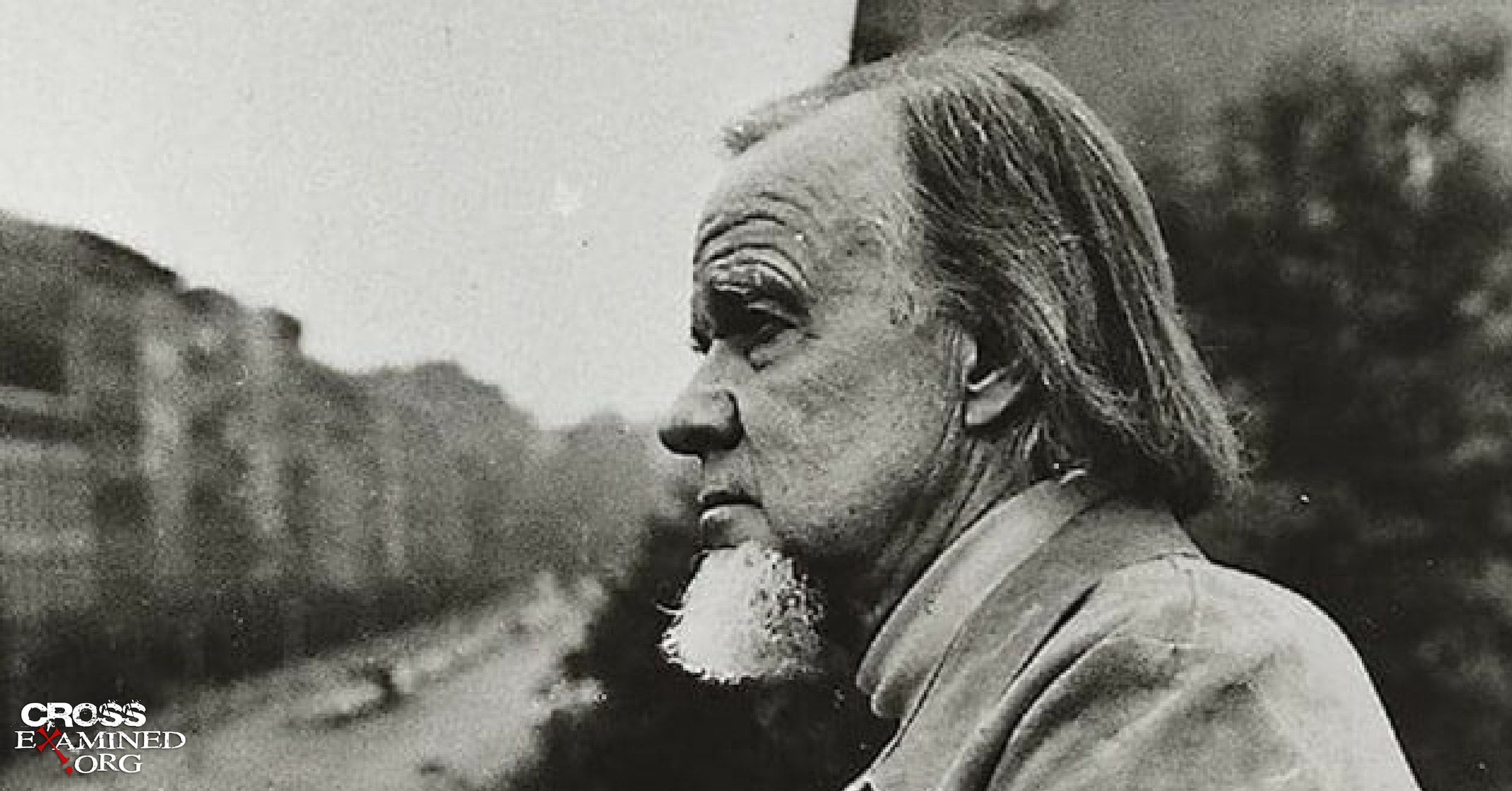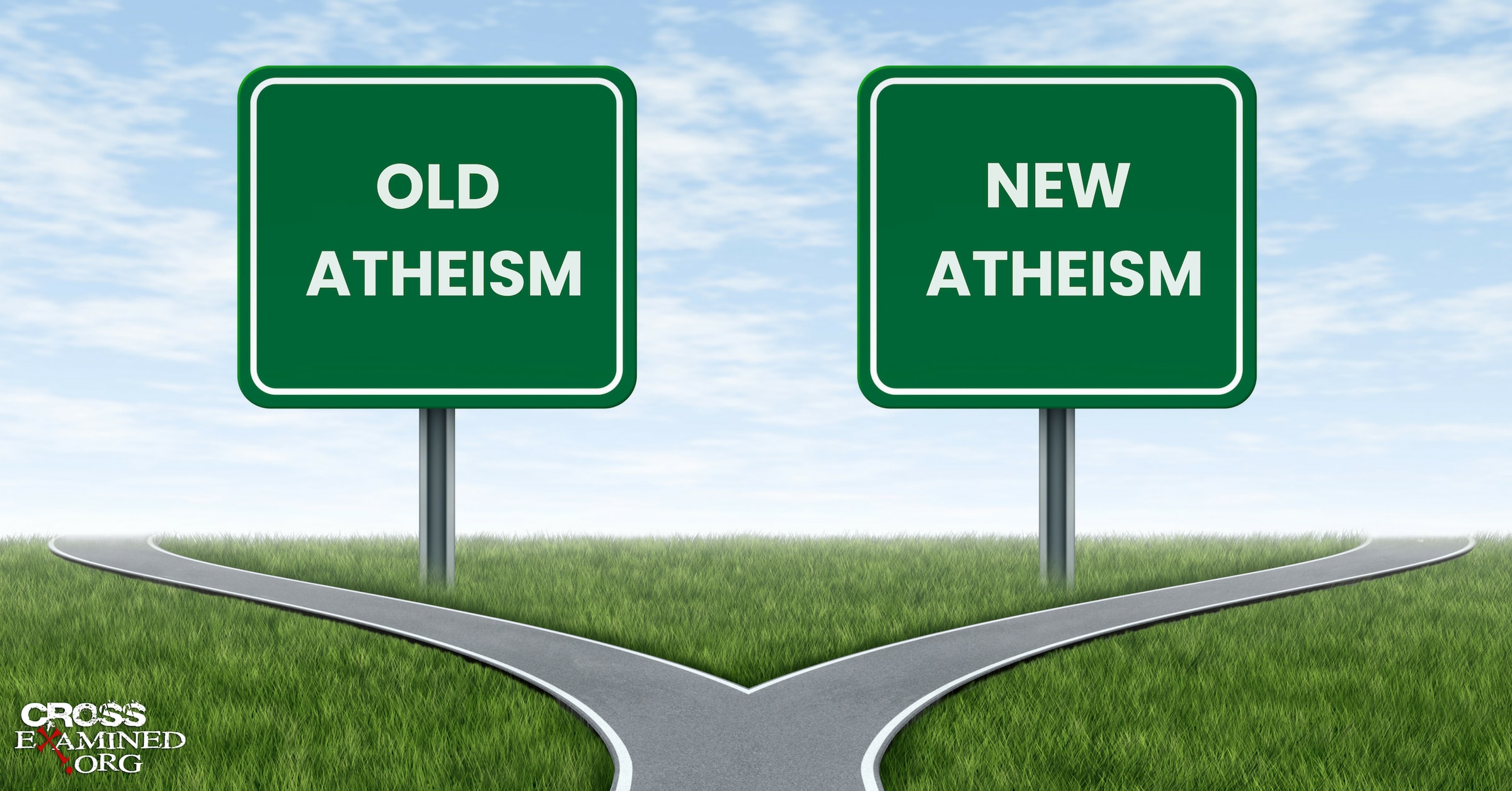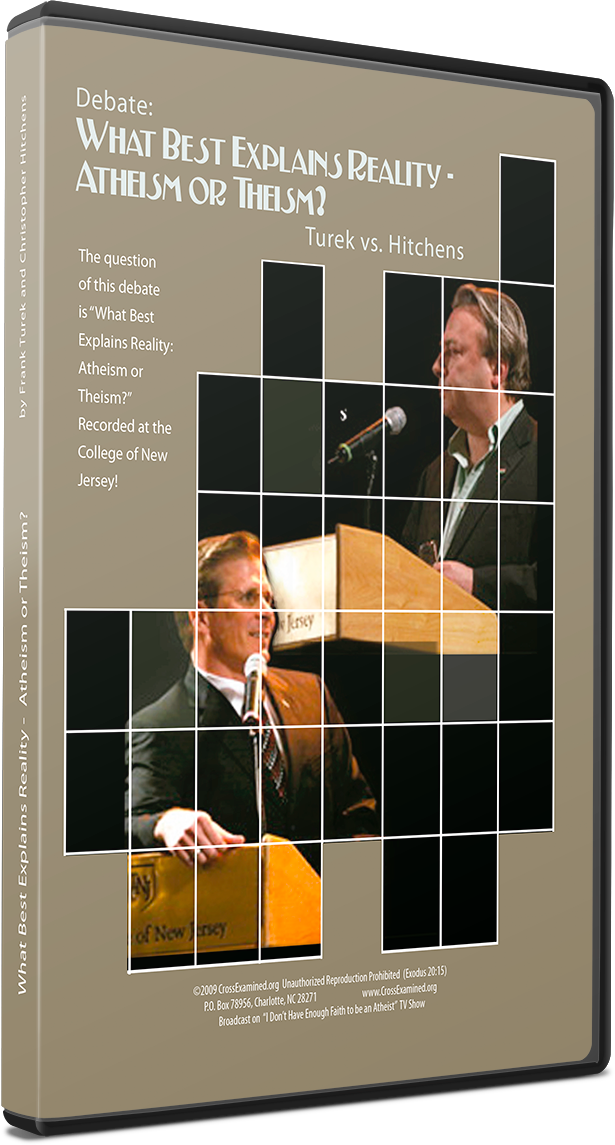By Wintery Knight
Here is the video of the debate:
TOPIC: DOES GOD EXIST?
MY NOTES ON THE DEBATE: (WC = William Lane Craig, CH = Christopher Hitchens)
WC opening speech:
Introduction:
WC makes two contentions:
– there are no good arguments for atheism
– there are good arguments for theism
These topics are IRRELEVANT tonight:
– the social impact of Christianity
– the morality of Old Testament passages
– biblical inerrancy
– the debate is whether God (a creator and designer of the universe) exists
- cosmological argument
– an actually infinite number of past events is impossible
– number of past events must be finite
– therefore the universe has a beginning
– the beginning of the universe is confirmed by science – the universe began to exist from nothing
– space, time, matter, energy began at the big bang
– the creation of the universe requires a cause
– the cause is uncaused, timeless, spaceless, powerful
– the cause must be beyond space and time because it created space and time
– the cause is not physical because it created all matter and energy
– but there are only two kinds of non-physical cause: abstract objects or minds
– abstract objects don’t cause effects
– therefore must be mind
- teleological argument
– fine-tuned constants and ratios
– constants not determined by laws of nature
– also, there are arbitrary quantities
– constants and quantities are in a narrow range of life-permitting values
– an example: if the weak force were different by 1 in 10 to the 100, then no life
– there are 3 explanations: physical law or chance or design
– not due to law: because constants and quantities are independent of the laws
– not due to chance: the odds are too high for chance
– therefore, due to design
– the atheist response is the world ensemble (multiverse)
– but world ensemble has unobservable universes, no evidence that they exist
– and world ensemble contradicts scientific observations we have today
- moral argument
– objective moral values are values that exist regardless of what human’s think
– objective values are not personal preferences
– objective values are not evolved standards that cultures have depending on time and place
– objective moral values and duties exist
– objective moral values and duties require a moral lawgiver
- argument from resurrection miracle
– resurrection implies miracle
– miracle implies God
– 3 minimal facts pass the historical tests (early attestation, eyewitness testimony, multiple attestation, etc.)
– minimal fact 1: empty tomb
– minimal fact 2: appearances
– minimal fact 3: early belief in the resurrection
– Jewish theology prohibits a dying Messiah – Messiah is not supposed to die
– Jewish theology has a general resurrection of everybody, there is not supposed to be a resurrection of one person
– Jewish theology certainly does not predict a single resurrection of the Messiah after he dies
– therefore, the belief in the resurrection is unlikely to have been invented
– disciples were willing to die for that belief in the resurrection
– naturalistic explanations don’t work for the 3 minimal facts
- properly basic belief in God
– religious experience is properly basic
– it’s just like the belief in the external world, grounded in experience
– in the absence of defeaters, those experiences are valid
Conclusion: What CH must do:
– destroy all 5 of WC’s arguments
– erect his own case in its place
CH opening speech:
- evolution disproves biological design argument
– evolution disproves Paley’s argument for a watchmaker
- God wouldn’t have done it that way
– God wouldn’t have waited that long before the incarnation
– mass extinction and death before Jesus
– God wouldn’t have allowed humans to have almost gone extinct a while back in Africa
– why insist that this wasteful and incompetent history of life is for us, that’s a bad design
– the universe is so vast, why would God need so much space, that’s a bad design
– there is too much destruction in the universe, like exploding stars – that’s a bad design
– the heat death of the universe is a bad design
– too many of the other planets don’t support life, that’s a bad design
– the sun is going to become a red giant and incinerate us, that’s a bad design
- Hitchens’ burden of proof
– there is no good reason that supports the existence of God
– all arguments for God can be explained without God
– atheists can’t prove there is no God
– but they can prove there is no good argument for God
- Craig’s scientific arguments don’t go far enough, they only prove deism, not theism
– the scientific arguments don’t prove prayer works
– the scientific arguments don’t prove specific moral teachings of Christianity
- if the laws of physics are so great then miracles shouldn’t be allowed
– good laws and miracles seem to be in contradiction
- extraordinary claims need extraordinary evidence
– none of Craig’s evidence was extraordinary
- science can change, so Craig can’t use the progress of science
– it’s too early for Craig to use the big bang and fine-tuning
– the big bang and fine-tuning evidences are too new
– they could be overturned by the progress of science
- Craig wrote in his book that the internal conviction of God’s existence should trump contradicting evidence
– but then he isn’t forming his view based on evidence
– he refuses to let evidence disprove his view
– but then how can atheists be to blame if they don’t believe
– so evidence is not really relevant to accepting theism
- the progress of science has disproved religion
– Christianity taught that earth was center of the universe
– but then cosmology disproved that
Response to the big bang and fine-tuning arguments:
– was there pre-existing material?
– who designed the designer?
WC first rebuttal:
Reiterates his 2 basic contentions
CH agrees that there is no good argument for atheism
– then all you’ve got is agnosticism
– because CH did not claim to know there is no God
– and he gave no arguments that there is no God
CH’s evolution argument
– irrelevant to Christianity
– Genesis 1 allows for evolution to have occurred
– Christianity is not committed to young earth creationism
– the origin of biological diversity is not central to Christianity
– St. Augustine in 300 AD said days can be long, special potencies unfold over time
– also, there are scientific reasons to doubt evolution
– cites barrow and Tipler, and they say:
– each of 10 steps in evolution is very improbable
– chances are so low; it would be a miracle if evolution occurred
CH’s argument that God is wasteful
– efficiency is only important to people with limited time or limited resources
– therefore God doesn’t need to be efficient
CH’s argument that God waits too long to send Jesus
– population was not that high before Jesus
– Jesus appears just before the exponential explosion of population
– conditions were stable – roman empire, peace, literacy, law, etc.
CH’s argument that Craig’s scientific arguments only prove deism, not theism
– deism a type of theism, so those scientific arguments work
– all that deism denies is a miraculous intervention
CH’s argument that Craig has a burden of proof
– theism doesn’t need to be proven with certainty
– must only prove a best explanation of the evidence
CH’s citation of Craig’s book saying that evidence should not overrule experience
– there is a difference between knowing and showing Christianity is true
– knowing is by religious experience which is a properly basic belief
– showing is done through evidence, and there the evidence does matter
CH’s rebuttal to the big bang
– there was no pre-existent material
– space and time and matter came into being at the big bang
– the cause must be non-physical and eternal
– cause of the universe outside of time means = cause of the universe did not begin to exist
– this is the state of science today
CH’s rebuttal to the fine-tuning
– CH says scientists are uncertain about the fine-tuning
– Craig cites Martin Rees, an atheist, astronomer royal, to substantiate the fine-tuning
– the fine-tuning is necessary for minimal requirements for life of any kind
– the progress of science is not going to dethrone the fine-tuning
CH’s argument about heat death of the universe
– duration of design is irrelevant to whether something was designed
– cars are designed, yet they break down
– design need not be optimal to be designed
– CH is saying why create if we all eventually go extinct
– but life doesn’t end in the grave on Christianity
CH’s rebuttal to the moral argument
– CH says no objective moral values
– but CH uses them to argue against God and Christians
– but CH has no foundation for a standard that applies to God and Christians
CH’s rebuttal to the resurrection argument
– empty tomb and appearances are virtually certain
– these are minimal facts, well evidenced using standard historical criteria
– best explanation of these minimal facts is the resurrection
CH’s rebuttal to a religious experience
– prop basic belief is rational in the absence of defeaters
– so long as Craig has no psychological deficiency, experience is admissible
CH first rebuttal:
it’s not agnosticism
– if there are no good arguments for theism
– then there is no reason for belief in God
– that is atheism
– everything can be explained without God
God wouldn’t have done it that way
– homo sapiens is 100K years old
– for 98K years, they had no communication from God
– lots of people died in childbirth
– disease and volcanos are a mystery to them
– life expectancy is very low
– they die terrible deaths
– their teeth are badly designed
– their genitalia are badly designed
– why solve the problem of sin by allowing a man to be tortured to death
– that’s a stupid, cruel, bumbling plan
lots of people haven’t even heard of Jesus
– many of them die without knowing about him
– they cannot be held responsible if they do not know about Jesus
the early success of Christianity doesn’t prove Christianity is true
– because then it applies to Mormonism and Islam, they’re growing fast
objective morality
– belief in a supreme dictator doesn’t improve moral behavior
– I can do moral actions that you can do
– I can repeat moral positions that you can say
religious people are immoral
– genital mutilation
– suicide bombing
moral behavior doesn’t need God
– we need to act moral for social cohesion
– it evolved for our survival
– that’s why people act morally
– it’s degrading to humans, and servile, to require God for morality
free will
– I believe in free will
– I don’t know why, because I can’t ground free will on atheism
– a bossy God seems to reduce free will because then we are accountable to God
WC cross-examination of CH:
WC why call yourself an atheist when you have no reasons?
CH because absence of belief is atheism
WC but agnosticism, atheism, verificationism all don’t hold that belief, which one are you?
CH I think God does not exist
WC ok give me an argument for the claim you just made to know God does not exist
CH I have no argument, but I don’t believe in God because it depresses me to think he might be real
WC would you agree that absence of evidence is not evidence of absence?
CH no I don’t agree
WC moral argument: it’s not epistemology it’s the ontology – have you got a foundation for moral values and duties?
CH I do not, it’s just evolution, an evolved standard based on social cohesion
CH cross-examination of WC:
CH you said that the historical reports of Jesus doing exorcisms are generally accepted – do you believe in devils?
WC I commit to nothing, what I am saying their historical consensus on the reports that Jesus did exorcisms
CH what about the devils going into the pigs, do you believe that?
WC yes I do, but the main point I’m making is that the historical reports show that Jesus acted with divine authority
CH do you believe in the virgin birth?
WC yes, but that’s not historically provable using the minimal facts methods, and I did not use the virgin birth in my arguments tonight, because it doesn’t pass the historical tests to be a minimal fact
CH do you believe that all the graves opened and dead people all came out?
WC not sure if the author intended that part as apocalyptic imagery or as literal, I have no opinion on it, have not studied it
CH do exorcisms prove son of God?
WC no, I am only saying that the historical reports show that Jesus exercised authority and put himself in the place of God
CH are any religions false? name one that’s false
WC Islam
CH so some religions are wicked right?
WC yes
CH if a baby were born in Saudi Arabia would it be better if it were an atheist or a Muslim?
WC I have no opinion on that
CH are any Christian denominations wrong?
WC Calvinism is wrong about some things, but they are still Christians, I could be wrong about some things, I do the best I can, studying theology, so I’m not wrong
WC second rebuttal
Response to CH arguments:
no reasons for atheism
– no reasons to believe that God does not exist
– CH withholds belief in God
why wait so long before contacting humans with Jesus
– population matters, not time – Jesus waited until there was about to be a population explosion
– there is a natural revelation (Romans 1) for those who lived before Christ
what about those who never heard
– (Acts 17:22-31) God chooses the time and place of each person who is born to optimize their opportunity to know him based on how they will respond to evidence (this is called middle knowledge)
– those who haven’t heard will be judged based on general revelation
WC re-assess the state of his five arguments:
cosmological argument
– heat death of the universe won’t happen on Christianity
moral argument
– if no objective moral standard, can’t judge other cultures as wrong
– no transcendent objective standard to be able to judge slavery as wrong
name an action argument
– e.g. – tithing
– the greatest command – love the Lord your God your God with everything you’ve got
– atheists can’t do that, and that is the biggest commandment to follow
moral obligations
– there are no objective moral obligations for anyone on atheism
– on atheism, you feel obligated because of genetics and social pressure
– on atheism, we’re animals, and animals don’t have moral obligations
resurrection
– the belief in the resurrection of 1 man, the Messiah is totally unexpected on Judaism
– they would not have made this up, it was unexpected
religious experience
– experience is valid in the absence of defeaters
CH second rebuttal:
faith and reason
– Tertullian says faith is better when it’s against reason
it’s easy to start a rumor with faith-based people
– Mother Teresa: to be canonized she needs to have done a miracle
– so there was a faked miracle report
– but everybody believes the fake miracle report!
– this proves that religious rumors are easy to start
– the resurrection could have started as a similar rumor by people wanting to believe it
name an action
– tithing is a religious action, I don’t have to do that
moral argument
– I can be as moral as you can without God
– I can say that other cultures are wrong, there I just said it
– without God, people would still be good, so God isn’t needed
religious people did bad things in history
– this church did a bad thing here
– that church did a bad thing there
– therefore God doesn’t exist
religion is the outcome of man’s struggle with a natural phenomenon
– that is why there are so many religions
WC concluding speech
no arguments for atheism presented
What CH has said during the debate:
– God bad, Mother Teresa bad, religion bad
atheism is a worldview
– it claims to know the truth
– therefore it is exclusive of other views
what does theism explain
– theism explains a broad range of experiences
– origin of the universe, CH has dropped the point
– fine-tuning, CH has dropped the point
– moral, CH says that humans are no different from animals – but an evolved standard is illusory, there are no actual moral values and standards, it’s just a genetic predisposition to act in a certain way – that’s not prescriptive morality
– resurrection, CH has dropped the point
– experience, Craig tells his testimony and urges the audience to give it a shot
CH concluding speech
HITCHENS YIELDS HIS ENTIRE CONCLUDING SPEECH!
A question & answer Period followed the end of the formal debate
Further study
Check out my analysis of the 11 arguments Hitchens made in his opening speech in his debate with Frank Turek.
Original Blog Source: http://bit.ly/2NGJ7Jn











